
JUDY KUHN
If pressed to name the top 10 voices in the modern musical theatre, three-time Tony Award nominee Judy Kuhn would definitely be among my choices. Kuhn, a Tony nominee for her work in She Loves Me, Les Miserables and Chess, possesses one of the richest and most exciting instruments around; it is also an extremely versatile and rangy voice, one which allowed the gifted artist the chance to create the soprano role of Cosette in the original Broadway production of Les Miserables and, years later, portray that character's ill-fated mother, Fantine, in the Les Miz revival, where she belted out a thrilling "I Dreamed a Dream" eight times a week. Thankfully, those vibrato-filled tones, which Kuhn utilizes with remarkable interpretive skills, will be on display at Feinstein's at Loews Regency March 6-10 when she debuts her all-new show, which will explore themes of love and happiness and will feature tunes by Joni Mitchell, Stephen Sondheim, Leonard Cohen, Cole Porter and more. Kuhn will be accompanied by a three-piece combo, led by music director Dan Lipton. Earlier this week, I had the pleasure of chatting with the singing actress, whose speaking voice is as warm as her singing. She also sprinkles her conversation with much laughter and spoke openly about teaching, singing on small and large stages and the possibility of returning to Broadway; that interview follows.
Question: I think last time we spoke you were just about to go into Les Miz.
Judy Kuhn: Oh, that was a while ago. I can't even remember when! [Laughs.]
Question: I'm just wondering what it was like playing the mother of the character that you created.
Kuhn: [Laughs.] It was a very surreal experience. It was sort of like visiting a childhood home where everything is kind of the same, but not quite the same, and you're different, and the house is different, but it's sort of haunted by people. And then, there was this girl wearing my dress! [Laughs.] It was very strange. It was very surreal, but it was fun to do. It was definitely fun to do. It felt like it was like a bookend — opening it and closing it. [Laughs.]
Question: There's the movie musical coming out. Why do you think that this show has had such a long life?
Kuhn: Well, you know, there's something about that story… It's relevant to every era. I think the issues that it's about, whether it's about poverty, justice, family, identity… It's about so many things that are so universal that I think it's timeless, really.
| |
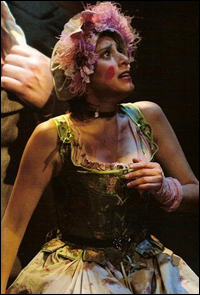 |
|
| Kuhn as Fantine |
Kuhn: Oh, you know, it's really hard to answer that because I don't think I was right to play Fantine in the original production, and, of course, when I played Fantine however-many-years-ago that was, I was way passed playing Cosette, so I think you play the part that you're right for, and, therefore, it's fun to play the part you're right for. Question: You've also been doing a lot of teaching lately. What is your approach to teaching?
Kuhn: Well, my interest and my focus is always on language and communication, and I guess that's why I call the workshops "Acting the Song" as opposed to "Singing the Song" because I always feel like there's so much emphasis on either technique or "How do I sound?" or "How do I present myself?" as opposed to "What am I saying?" and "Who am I speaking to?" I think the most exciting kind of performing to watch, whether it's in a cabaret setting or on stage in a musical play, is seeing real communication. I think the best performances in musicals are when you don't notice when a person goes from speaking to singing. When people speak as they sing is what's exciting to me. And, I always, as an audience member, am most interested when I feel like someone is talking to me even when they're singing. So, that's what I try to teach. We do, in class, a lot of speaking of the songs and then moving into singing, really focusing on every word that's in the song and making sure you understand exactly what every word means and why a writer chose that particular word. It's not surprising, really, when you start speaking a song or really confront the language in a song, there's a lot of words that you didn't notice were there or a lot of thoughts you didn't notice. Songs can often feel like you're reporting on something as opposed to living something, and [I emphasize] the idea of "What is your relationship with an audience?" or that "a song is always a scene," even when you're alone on stage because you have a relationship with the audience. That's sort of the stuff I mostly address in those classes. It depends, also, on who's in the class and what their particular needs are.
Question: Do you find that you've learned anything from teaching, from doing these master classes?
Kuhn: Oh, absolutely! I think you always teach what you want to learn and what you want to do. It's always interesting to me to be teaching while you're working on something myself—like this upcoming thing at Feinstein's because I'm thinking all the time, "Am I doing all the things? Am I approaching the material the way I always encourage my students to approach it?" [Laughs.] When I was doing a run at Joe's Pub a few years ago, I had been teaching a class, and a lot of my students came to one of the shows, and I have never been so nervous! The whole time I was thinking, "Am I doing what I told them to do?" [Laughs.] I felt like they were all looking out for that. [Laughs.]
| |
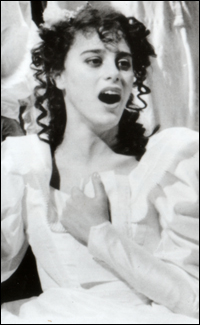 |
|
| Kuhn as Cosette | ||
| Photo by Michael Le Poer Trench |
Kuhn: Oh, yes. Many, many. Teachers and directors, I would say. Speaking of Les Misérables, Trevor Nunn definitely… was a teacher of mine… He emphasized so much storytelling; whatever you do and however you do it, it tells a particular story, so you have to always know what story you want to tell, and that is so true when you're on stage alone. And, also, I learned a lot from him because he worked on this in Les Misérables a lot because every character, at some point, finds themselves alone on stage and has a soliloquy moment, and he worked a lot on how to approach that. The things I've learned from him I've used all throughout the work I've done since… And, I have a great voice teacher, Bruce Kolb, who's really kept me honest, vocally.
Question: Do you still study?
Kuhn: Yes, I do. I don't go every week, but I go when I feel like I need it or when I'm learning new material and I want to make sure that I'm not creating bad habits for myself. [Laughs.] And, he's very much interested in language, too. That's one reason why—aside from the fact that he's a great technique teacher—I love working with him on material… There are acting teachers like Michael Howard, who was a huge influence on me. But, also, I studied at Michael Howard's studio with a teacher named Patsy Rodenburg, who is a voice and text teacher—speaking voice and text. She works with the Royal Shakespeare Company, and I took some Shakespeare workshops with her, and everything she worked on—technically, vocally, she works a lot on breath and all of that—I use in my teaching, and I've applied to all the work I've done on stage. And, that's also what I try to work on with students is that there really isn't a difference between singing and speaking on stage. There really is no difference. You might need a little more breath for singing and, obviously, there are other elements that you're bringing into it like pitch and phrasing and all of that, but in terms of how you use your voice and your breath and your psychology and all of that, it's really the same. I really learned that, I think, from Patsy because everything we worked on with Shakespeare is rooted in the same technique that I use, vocally, when I'm singing, and, also, it just brought so many other elements into my singing and all of my work on stage. In fact, when I played Fosca in Passion at the Kennedy Center, I got stuck… I actually got a note from Steve Sondheim about something and I was sort of stuck on how to get there, and I used her exercises to get there. I realized how much I could apply what I learned from her to what I do on stage. That was a long answer! [Laughs.]
| |
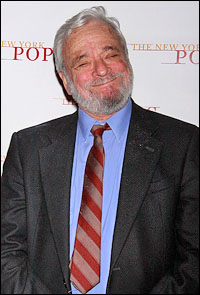 |
|
| Stephen Sondheim | ||
| photo by Joseph Marzullo/WENN |
Kuhn: Well, you have to go first through the whole, "Oh, he hates me" craziness to get back to, "Oh, actually, that was a really good note." [Laughs.] In fact, he loved that production, and he loved all of us in it, and it was one of the most rewarding things I've ever done. And, actually, when you can get over the neuroses that it brings up—getting notes from him—he actually gave incredibly useful, great notes.
Question: And, they're doing Passion again.
Kuhn: I heard!
Question: Would you be interested in being part of that production?
Kuhn: Sure! I would love to play that part again. To me, that was one of the most perfect work experiences I've had. I wouldn't have changed anything about it—the direction, the design, everyone in the cast was amazing, the audiences were so responsive—it was fantastic. The only thing I would've changed is I would have done more performances. [Laughs.] We only did 15 performances, and it seemed so sad to me to have done all that work and only get to play it that many times. So, if I had another opportunity to play that part, I would leap at it… I remember reading that John Doyle is directing it, and he is someone I would love to work with, too. All of my friends who have worked with him just love him. Question: Tell me about the show that you're putting together for Feinstein's.
Kuhn: Well, let's see… It's, as my tastes tend to dictate, it's very eclectic in terms of material. I'm singing a song from Passion in it, but I'm also singing Tom Waits and Joni Mitchell and Cole Porter and Cy Coleman and Leonard Cohen, so it's a mix. And, I would say that what happens to me when I put something like this together is I make lists of songs that I feel, "Oh, I really want to sing that," and then I look at the list and find out what it is I'm really thinking about and why I chose those songs. And, every single one of these songs is about love and attachment and happiness and how attachment binds you and how it frees you. All the songs talk about love and freedom and when they go together and when they don't. [Laughs.] So, I guess that's what this show is about, although I don't have a title for it. The music director is Dan Lipton, who's wonderful and who's done great arrangements, and he's playing at the piano, and we have a cello and percussion, so it's a sort of twist on the jazz trio. [Laughs.]
Question: I love the sound of the cello.
Kuhn: The thing that's so great about it is that he can sometimes be a bass and then he can also be a cello. And, the percussionist is doing hand-percussion. He's playing mostly djembe and cone, and so sometimes he can sound like a drum kit, but he's doing all this great hand percussion, which just gives it another vibe, which I love. For some reason, I didn't want to do the standard jazz trio with the bass and drum kit, and I've always wanted to work with percussion, and it was Dan's suggestion to add the cello to have that bass sound… I love the cello. I used cello in my Laura Nyro show, too. Somebody said to me that the cello is the closest instrument to the human voice, and I think that's true, and I think that's why it's such an emotional instrument—why people have that kind of visceral response to the sound of the cello.
| |
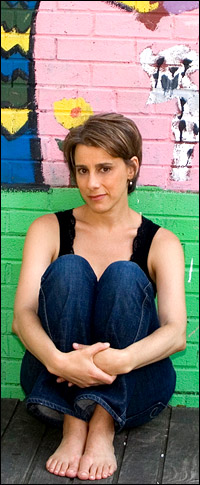 |
|
| Judy Kuhn |
Kuhn: I do. I love it. I love being able to sing what I want… I'm not a writer. I don't write plays or musicals or songs or anything, but it gives me a chance to kind of be a writer because I think in such a narrative way, like how songs go together and what stories they tell when you put them together. It kind of gives me a chance to be a writer a little bit, and I love working on arrangements, partly because of the way I love language to think about how can this song be best expressed musically—how can you best tell the story in terms of the choices you make with the feel of it and the tempo of it. Dan is a great collaborator… I don't know how to talk in musical terms. [Laughs.] In terms of like, "I think you should play these chords," but I can say, "This is what the song means to me, and this is the story I want to tell, and this is how I feel about it." And, it's wonderful when you have someone at the piano who can say, "Well, how about then I try this?" and say, "Oh, that's great" or "That's not quite it. Let's try this." And, I love that collaboration, and I love working with all kinds of musicians, so it's really fun to put it together. It's nerve-wracking.
Question: When it's all on you?
Kuhn: Exactly. It took me a long time to get used to that. I did not really want to be up there by myself. [Laughs.] But it is a very satisfying thing to do.
Question: What's it like for you performing in such a small space as opposed to a Broadway stage?
Kuhn: I both love it and find it terrifying. It's so intimate… You're there. There's no denying that they're there with you. I mean, it's also different, of course, because I'm "me" on the stage as opposed to playing a character. [On Broadway] you can sort of forget—even though the audience is a character in a show—they're there and you're aware of them, and you have to be aware of them and make sure you're communicating with them. You can also put them in ten percent of your brain, and then the rest of your brain can be on the actor that you're playing the scene with, where as they're 100 percent in your brain in a small room… But it's also great because I love the conversation with the audience. I love being there with them and speaking directly to them when I'm singing, so I find that now that I'm over my initial abject terror of it, I actually enjoy that part of it. [Laughs.] But it is hard. You're very vulnerable. It's very exposing.
Question: Especially some of those rooms—the audience is two inches from you.
Kuhn: You know, when I'm singing to an audience in a concert setting, I don't like it when I can't see them. I actually find that more nerve-wracking in a way. I feel too alone. So, being able to see them and actually speak directly to them, I really like that a lot.
Question: I would think that you get more back, something more to feed off of rather than singing into black space.
Kuhn: Exactly. It's actually comforting not being alone. Question: I'm just curious, who are singers or musicians that you currently admire or music that you listen to?
Kuhn: Oh, my God. Wow. You mean in terms of who am I listening to now or who do I really admire in my life?
| |
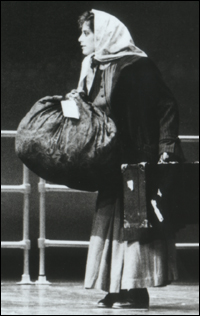 |
|
| Kuhn in Rags. | ||
| photo by Carol Rosegg |
Kuhn: Well, I mean, in terms of songwriters, I suppose the touchstones for me when I was growing up were Joni Mitchell and Bonnie Raitt—singers and songwriters that sort of spoke to me—and, more recently, Laura Nyro, and from the theatre world, Stephen Sondheim, Richard Rodgers—both with Hart and Hammerstein—Harold Arlen… Oh God, there's too many to mention! [Laughs.] Performers: Billie Holiday. I mean, talk about somebody who didn't necessarily have the greatest voice that anybody ever had, but was absolutely—she always knew what she was saying. Always had something very important to say, and you had to listen to that. That to me—there's just nothing like that.
Question: Is there any chance of recording this show?
Kuhn: You know, I would love to, but I have to have the funds to do it. [Laughs.] But, you know, I want to see how it goes, and if I have a chance to do that, I would love to. I'd love to. Hopefully, the four nights at Feinstein's won't be it. [Laughs.] That's always the fear. It's like, "Okay, I'm putting all this work and investing all this time and money and everything into it," and that can't be it! [Laughs.]
Question: With the Laura Nyro show, it seemed like you got to perform it a lot of different places.
Kuhn: Yeah, I got to do that a lot, and that was really satisfying. I would have happily done it more, but it was an expensive show. It was hard to book it. But, if I had the chance to, I would do it in a second.
Question: What are your thoughts about some of the singing competitions on TV? Do you watch any of them?
Kuhn: I don't. I used to watch "American Idol" briefly with my family. For a few years we watched it, but I haven't in the last couple years. And, that's the only one. There are definitely some talented people on those shows… I don't know if I should say it, but I guess I find that there's a lack of interest in craft. It's all about "make me a star." I know they work hard at it, but I don't know. Of course, the emphasis is so much on the sound and style and not to me enough on "What are you singing about? Why are you singing that song?"
Question: How do we get you back to Broadway?
Kuhn: I guess somebody has to offer me a job! [Laughs.] You know, I have to admit, the last several years, I've had a certain ambivalence about the theatre schedule because my daughter is a teenager, and the evenings are when I get to see her, and she's going to college in the fall, so life is going to change significantly. [Laughs.] And, I'm ready to take on anything basically, so we'll see maybe if things come up that are exciting to me.
| |
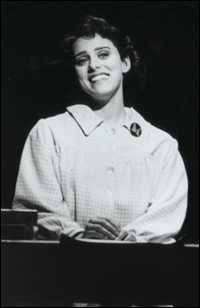 |
|
| Kuhn in She Loves Me. | ||
| Photo by Carol Rosegg |
Kuhn: She does. She's a really good musician. She plays the piano, and she sings—beautiful voice. More interested in the pop world than the theatre world. She loves going to the theatre, but is not the girl who listens to cast albums and wants to be in every musical, although she likes doing theatre at school. But she has really good taste in music—really good taste in music. In fact, when Dan was at my house once for a rehearsal and Anna—my daughter—came out of her room and said, "Mom, did you hear Etta James died? That is so sad!" And, he looked at me like, "She knows who Etta James is?"... "Yes, she has very good taste!" [Laughs.]
Question: What are your thoughts about her going away to college?
Kuhn: You know, it's very bittersweet. I'm very excited for her because I think she's amazing, and I think she's going to do all kinds of great things in her life, but it's going to be a big transition. As all my friends who have kids in college say, "Don't think they're leaving because they're going to be home so much. They aren't actually in school very much when they're in college." [Laughs.] You know, they have like six weeks off for the holidays, and then they have two weeks off in the middle of each semester… long summer break. I'm sure we'll see a lot of her. [Laughs.]
To read Kuhn's favorite theatre performances, click here.
[Show times at Feinstein's are 8 PM March 6 and March 8-10 with additional 10:30 PM shows March 9-10. All shows have a $30 cover with $50 premium seats available, in addition to a $25 food and beverage minimum. Jackets are suggested but not required. Feinstein's is located at 540 Park Avenue at 61st Street in New York City. For ticket reservations and club information, call (212) 339-4095 or visit feinsteinsatloewsregency.com and TicketWeb.com.]
Well, that's all for now. Happy diva-watching! E-mail questions or comments to [email protected].










